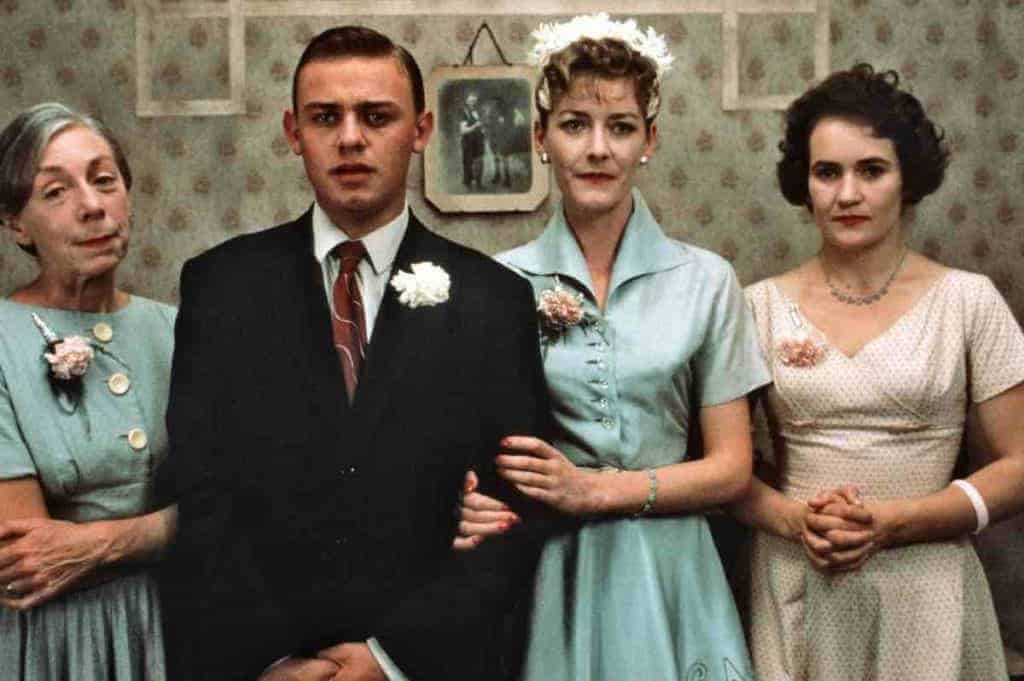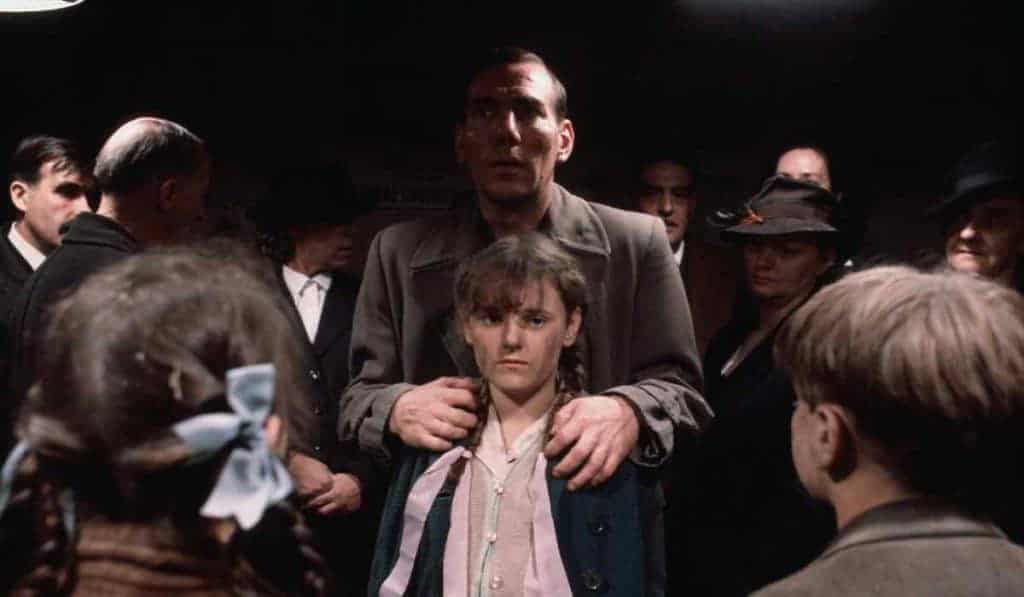In Terence Davies’ films, fathers tend to control the domestic sphere: the abusive patriarch in Distant Voices, Still Lives, based on Davies’ own father, prefigures those of Davies’ later literary adaptations. Editor’s note: This is the fifth feature in our Special Issue on Terence Davies’ A Quiet Passion, which can be read in full here.

Terence Davies’ semi-autobiographical film Distant Voices, Still Lives opens on Eileen’s (Angela Walsh) wedding day. She poses — with her younger brother, Tony (Dean Williams), her younger sister, Maisie (Lorraine Ashbourne), and her mother (Freda Downie) — for a picture in front of a framed photo of their late, abusive father (Pete Postlethwaite). Eileen wistfully proclaims, “I wish me dad was here”. But Maisie’s voice-over makes it clear that despite the sepia-tones often associated with fond memories, this is not that type of nostalgia film: “I don’t. He was a bastard, and I bleeding hated him.” Davies structures the film around fragments of the children’s memories, which, in short order, reveal their father’s tyranny. Maisie scrubbing a rat infested cellar to earn her father’s permission to go to a dance. An adult Tony smashing a window, demanding to fight his father. The children witnessing their father’s vicious beating of their mother, the camera panning over her bruises.
[clickToTweet tweet=”In DISTANT VOICES, STILL LIVES, men’s feelings have been reduced to social scripts.” quote=”Men’s feelings have been reduced to social scripts rather than a true emotional connection. “]
Yet Davies complicates this vision of a monster with hints how his life could have gone a different way. On Christmas Eve, the father looks over his sleeping children, sighs “God bless kids,” and fills their stockings. Davies does not want this misread as sympathetic. On the BFI DVD commentary track, Davies remarks, “a lot of people have said about this bit that it makes him more human… but my response is always the same. Like all tyrants, he is moved by sentimentality, not by real emotion, ‘cause if he really wanted to show his love, he should have said it to them when they were awake.” Davies makes the father’s lack of reflection explicit in the film: the very next scene shows what appears to be a calm family meal, only for the father to start shaking uncontrollably, ripping the tablecloth to the ground, screaming in rage that the meal is not yet ready.
[clickToTweet tweet=”Davies complicates his vision of a monster with hints how his life could have gone a different way.” quote=”Davies complicates this vision of a monster with hints how his life could have gone a different way.”]
So why can he be “moved by sentimentality” but fall short of experiencing real emotion that motivates actions? There’s no indication that he was changed by a traumatic event, like the military training that turned Sunset Song’s Ewan (Kevin Guthrie) from gentle to sexually violent. Instead, Davies’ answer is almost prosaic. After his death, Maisie asks her mother why she married such a horrible man, unable to reconcile him with a mother she loves. Her mother responds, “He was nice. He was a good dancer.” As a suitor, he was performing a different kind of masculinity than he would later turn to as a father. Fathers, particularly in the mid-20th century England, were expected to use “discipline”, physical or otherwise, to teach their children their place in society. Maisie’s father used this as an excuse to express his anger, just as being a suitor required hiding it.

In Davies’ films, fathers tend to control the domestic sphere: the abusive patriarch in Distant Voices, Still Lives, based on Davies’ own father, prefigures those of Davies’ later literary adaptations, The Neon Bible and Sunset Song. Even A Quiet Passion’s Edward Dickinson (Keith Carradine), who doesn’t rule through physical violence, strongly disapproves of women having public lives and seeks to restrict his daughters to the home. Davies’ later films focus more on how women survive oppression through bonds with other women, rather than how fathers serve as obstacles in the lives of his female protagonists. Yet even these friendships are constantly undermined by patriarchy. In Distant Voices, Still Lives, Eileen’s increasingly restrictive husband prevents her friends from visiting. In A Quiet Passion, succumbing to the social pressure of marriage forces Vryling Buffam (Catherine Bailey) to move with her husband away from her supportive circle, including Emily. While it’s unknown how this affects Vryling, this is the beginning of Emily’s increasing isolation. Even outside of marriage, men’s actions confine women.
[clickToTweet tweet=”In Terence Davies’ films, fathers tend to control the domestic sphere.” quote=”In Davies’ films, fathers tend to control the domestic sphere.”]
Distant Voices, Still Lives differs from most of Davies’ films in that it directly contrasts how men and women navigate private spaces. While women have their close bonds, where mutual vulnerability means mutual support, men can only relate to other people through conflict or control. The father in Distant Voices, Still Lives, like all Davies’ other fathers, is never shown in a place he could relax with other people; he is only at peace the two times we see him alone. Even in the supposed “private” sphere of his home, he still feels compelled to act in a certain role, as he needs to forever assert himself over his wife and children. He places great value upon home, evidenced by his staggering out of hospital to die in his space. But this value is possessive: home is not a refuge, but a stronghold that must be maintained.
[clickToTweet tweet=”DISTANT VOICES, STILL LIVES directly contrasts how men and women navigate private spaces.” quote=”Distant Voices, Still Lives differs from most of Davies’ films in that it directly contrasts how men and women navigate private spaces.”]
While the women in the film find community, men’s pursuit of patriarchal roles leaves them emotionally hollow. Davies emphasizes that men’s feelings (“like all tyrants, he is moved by sentimentality”) have been reduced to social scripts rather than a true emotional connection. Davies’ fathers prioritize their social roles rather than connections with others, which condemns them to lonely lives built around grasping for control. They are unable to form the close bonds that would not only free others from their oppression, but also make their lives more fulfilling.
Read the rest of our Special Issue on Terence Davies’ A Quiet Passion here.

